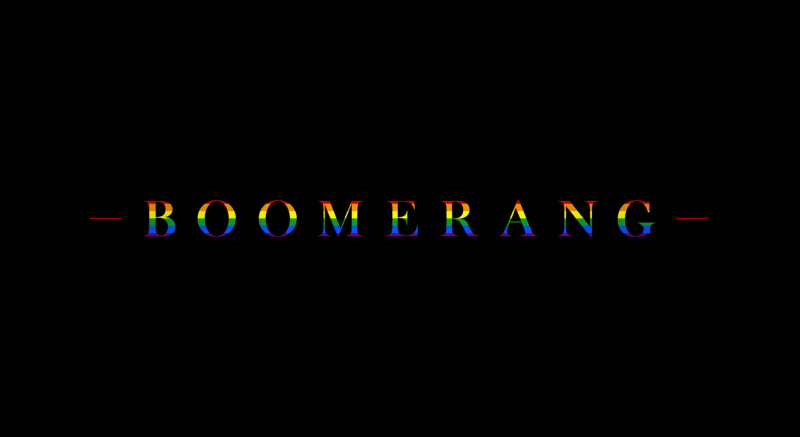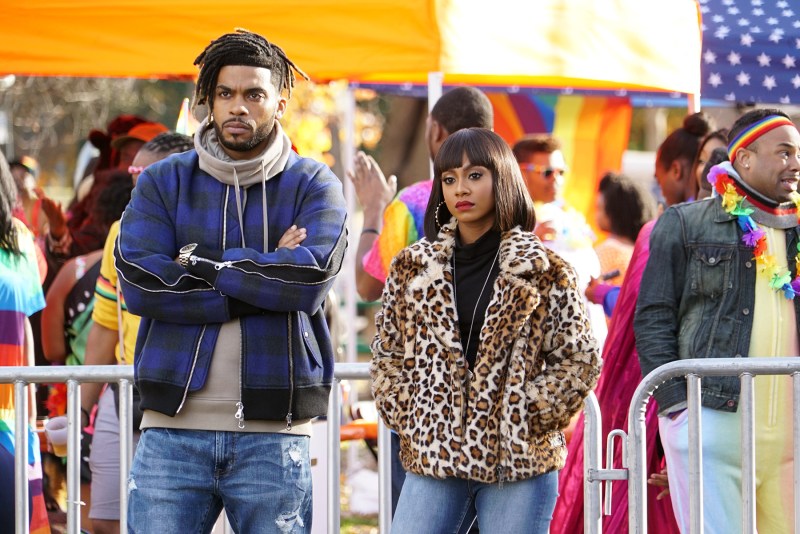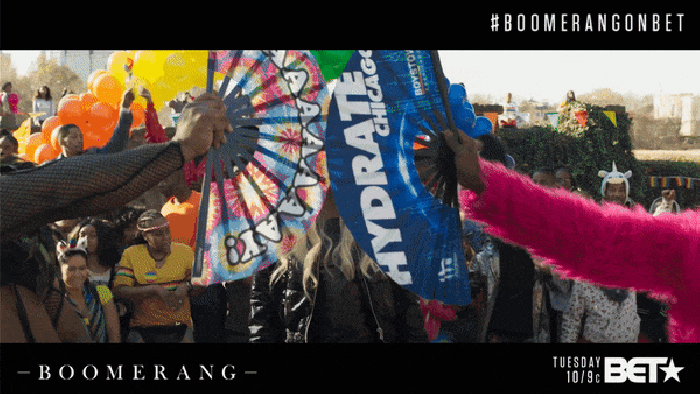Last week on BET, Boomerang began its episode the same way it’s begun each episode that’s come before: With the title in simple, bold print over a blank screen. This time? The word went from black to rainbow, and just like that I already knew – we were off really to the races.

When the sitcom premiered in February, I detailed the black pop culture and TV field that it was joining – one where critics’ darling black trans and queer television productions like Pose were still not getting the awards recognition it deserved from organizations like the NAACP, where black LGBT millennial voices were still being erased en masse out of our own cultural productions. I hoped that, given Lena Waithe’s professional reputation and the fact that Boomerang came out the gate with two black queer characters (Tia, a lesbian, and Ari, one of the few black bisexual men on television) in its main cast, this show could help move the needle.
In the last few weeks my expectations have been more than exceeded. Not only has Boomerang proven itself to be one of the most cutting edge black voices on television, it’s also invested in showcasing a full spectrum of young blackness, including sexuality. The crew of 20something best friends at the sitcom’s core include upper middle class and wealthy black characters Simone and Bryson (whose parents are the central characters in the original Boomerang movie that the BET sitcom is spun-off of); there’s also working class characters like Tia and Ari, Tia works as a dancer at a strip club and Ari hustled odd jobs – including being a bouncer at a gay club – to support himself as the first in his family to go to college; David and Crystal, college sweethearts who are now divorced in their mid-20s, are people of faith; David is the pastor of his own storefront church.

Over the course of it’s first seven episodes Boomerang has taken its time with the history and development of each character, eschewing the typical frantic comic beats of a mainstream sitcom for a more subtle and lived-in humor that echoes Waithe’s signature writing style in her Emmy Award winning episode of Master of None. Joke payoffs come from intimately knowing the perspective of the person speaking, rather than anything madcap.
Not that I have something against eccentric, pushy, or over the top comedies! Television shows like 30 Rock, which always rushed to its next joke even at the sake of its own plot, or Brooklyn 99, where common catch phrases (“Noice!”) rule the day, have a well deserved place in sitcom platform of the last decade. The original film Boomerang based itself off the frenetic energy of its lead comedian, Eddie Murphy. Still, there is something refreshing about the writers’ room that Waithe has assembled for Boomerang; they don’t mind leaving room to ride the air of quiet humanity in between the show’s beats.
This approach works particularly well for Tia and Ari, both of whom have their sexuality dealt with upfront and with zero-to-no fanfare. When the audience learns of Ari’s bisexuality in the second episode, it’s dealt with in a funny text message conversation with Simone that involves Ari boasting over his most recent hookup. In the fourth episode (“Call A Spade”), Tia’s girlfriend, Rocky, a stud black lesbian, is introduced to the audience mid-hookup with Tia. Rocky’s clad in a grey undershirt, Tia’s making out on top of her in her t-shirt and panties, when Simone busts through the door. There’s nothing aghast about it, in fact Simone just rolls her eyes and continues to talk about the emergency of the day (a family friend has found herself in lock up after a drunk yelling match with her boyfriend). As the girls rush off to save their friend in need, Rocky agrees to be their ride – after Tia promises to finish where they left off later, of course.
It’s been weeks and I still can’t get that particular episode out of my head. BET has a common phrase they use in their advertising, “We Got You,” but the truth is that they haven’t always had the backs of their black LGBT audience. I’ve racked my brain and I cannot think of a single other time when I’ve seen two women share a bed on their network. Now here are Tia and Rocky, and they’re leaving nothing to the imagination. It’s treated as common as the time of day. There’s no less scandal to it than any of the numerous straight hookups shown on the show. Two episodes later in “Homecoming,” a flashback dedicated to the crew’s college years, we watch Ari’s first gay kiss. It’s framed as romantic and warm, perhaps even innocent. Once again, my jaw was on the floor.
I couldn’t believe this was BET that I was watching at all. Just within the last 10 years, this network was still bleeping the word “homosexual” off their syndicated reruns of CW sitcoms The Game and Girlfriends.
Then came last week. In its seventh episode, aptly titled “PRIDE,” the crew attends Atlanta’s Black Pride festival to film Tia’s newest music video (to the best of my knowledge Atlanta Pride happens in summer and this crew is 100% wearing winter coats, but you know what? Let’s give it a pass). It’s here that the unhurried pace of the show’s character development really pays off. As our writer Natalie put it:
https://twitter.com/natthedem/status/1108200966199885824
Most striking is that we not only see Tia and Ari comfortable in their own black queer skin, but that the director chooses to highlight – via portrait style close ups – a variety of festival goers. Black trans women and men, black studs and butches, black femmes of all genders, black drag performers, black masc gay men – the whole family is accounted for. And we’re happy, we’re smiling, we’re…. Proud. There is not a single second in the episodes 22 minute run time where black queer folks are asked to check any part of ourselves at the door. It’s unforgettable and, quite frankly, revolutionary.
Of all the representation, it was the inclusion of black trans people throughout the festival that left me choked up. In June 2013 – for those keeping track, that’s less than merely six years ago – B. Scott, a black non-binary trans femme performer and gossip columnist, was forced off of the BET Awards red carpet for their femme fashion. After being invited by the network to help with their awards show coverage, Scott was asked to remove their make up, change into more “masculine” clothes that they felt uncomfortable in, and pull back their long hair. Maybe this feels like a small moment for those who didn’t live through it, but I’ll never forget my outrage. The utter confirmation that, as a black queer person, my acceptance in black cultural spaces was always going to policed and reprimanded. That cultural gatekeepers like BET might never actually accept “all of us.” Scott settled their lawsuit against the network in 2015, but those scars take a long time to heal.

Last week, Lena Waithe took a hammer to that legacy. Tia starts her music video framed in the fans of two black femme gay men living every bit of their ballroom life. It’s cathartic and joyous and simultaneously the queerest, blackest piece of art I’ve seen since Pose went off the air last summer. It’s certainly the blackest and queerest thing I’ve seen on a black network EVER. David and Crystal are using the festival to recruit new partitioners to their church, proudly declaring that “being queer isn’t a choice; it’s a gift from God.” Maybe the line was directly squared at a portion of BET’s church going audience, I don’t know, but damn it was healing for me to hear.
When Ari runs into an ex-girlfriend at the festival – she’s supposedly attending to support her “gay ass” brother, but to be honest with you she’s the worst ally I’ve ever seen – she berates him for his bisexuality. She tells him that she’s gonna pray for him. Still, Ari stands strong. He won’t put himself into a box for anyone.
In fact it’s Ari’s pride in his sexuality that inspires him to change the format for Tia’s video altogether. Instead of just being about her, the new music video becomes about us. A black lesbian surrounded by her queer and trans family, brought together, celebrating our own skin and our own love and existing in our fully black world without any apologies.
If you weren’t paying close attention, if you didn’t know the history, you might have even almost missed it – but what Lena Waithe is producing on BET right now is nothing short of a reclamation.
Bump that, it’s a reckoning.







